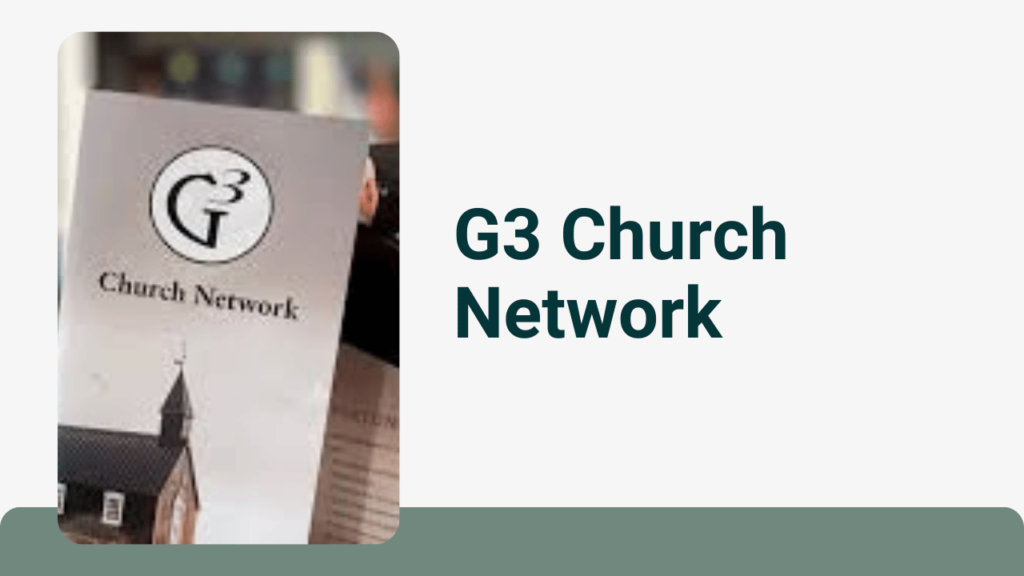In recent years, theological movements have sparked renewed interest among Christian communities. The G3 Church Network, a growing collective of like-minded churches, has become a focal point in these discussions. But what exactly drives this network? And more importantly, is it rooted in Calvinistic theology? If you’ve ever wondered how Calvinism—with its emphasis on doctrines like predestination and God’s sovereignty—influences modern church networks, you’re in the right place.
With over 60% of Protestant pastors identifying as Calvinistic or leaning towards Reformed theology, it’s clear that these principles hold sway in shaping evangelical doctrine today.
Yet, the G3 Church Network isn’t a one-size-fits-all model. While many of its leaders uphold core tenets of Reformed theology, the network’s broader mission and practices invite a nuanced exploration.
What is the G3 Church Network?
The G3 Church Network was established as an extension of the G3 Ministries, which aims to equip and encourage churches through conferences, resources, and theological education. Grounded in a commitment to Scripture and a high view of God, the network emphasizes biblical fidelity and doctrinal precision. Its mission includes providing support for pastors, fostering community among churches, and promoting a God-centered worldview.
Calvinism: A Brief Overview
Calvinism, named after the reformer John Calvin, is a theological framework that centers on God’s sovereignty and the doctrines of grace. Its core principles are often summarized in the acronym TULIP:
- Total Depravity – Humanity is inherently sinful and incapable of choosing God without divine intervention.
- Unconditional Election – God elects individuals to salvation based on His will, not human merit.
- Limited Atonement – Christ’s atonement is sufficient for all but effective only for the elect.
- Irresistible Grace – God’s grace is effective and cannot be resisted by those He calls.
- Perseverance of the Saints – Those truly saved will persevere in faith until the end.
These doctrines influence how Calvinistic churches approach worship, preaching, and ministry, emphasizing God’s glory over human-centered perspectives.
Is the G3 Church Network Calvinistic?
The G3 Church Network’s theological foundation leans heavily on Reformed principles, but it’s not exclusively Calvinistic. Its emphasis on expository preaching, the sufficiency of Scripture, and God’s sovereignty aligns with many aspects of Reformed theology. However, the network’s mission extends beyond theological labels, focusing on biblical truth and gospel-centered ministry.
Key Indicators of Calvinistic Influence
- Expository Preaching: The network encourages pastors to preach through books of the Bible, emphasizing the text’s authority and context.
- Doctrinal Resources: G3 Ministries provides materials rooted in Reformed theology, including works by prominent Calvinist thinkers like John MacArthur and R.C. Sproul.
- Sovereignty of God: Many affiliated churches affirm God’s sovereignty in salvation and all aspects of life, a hallmark of Calvinism.
Broader Theological Diversity
While Calvinism plays a significant role, the G3 Church Network also includes churches that identify as broadly evangelical or Baptistic. This diversity allows the network to foster unity among churches with shared commitments to Scripture without requiring strict adherence to all Reformed doctrines.
Practical Implications for Churches
The theological stance of the G3 Church Network has practical implications for pastors, congregations, and ministries:
- Worship: Emphasis on God-centered worship over entertainment-driven approaches.
- Discipleship: Focus on deep, theological teaching that equips believers to live out their faith.
- Mission: Commitment to gospel proclamation and church planting.
Theological Education Through G3
One of the network’s defining features is its commitment to theological education. Through conferences, online courses, and publications, G3 equips pastors and lay leaders to handle Scripture with precision. These resources often emphasize:
- Hermeneutics (biblical interpretation)
- Systematic theology
- Church history
This emphasis aligns with the Reformed tradition’s commitment to intellectual rigor and doctrinal clarity.
Addressing Misconceptions
Some critics argue that Calvinistic theology can lead to exclusivity or a lack of evangelistic zeal. However, the G3 Church Network counters this narrative by highlighting the missional aspect of Reformed theology. Its churches actively engage in community outreach, missions, and evangelism, demonstrating that deep theology and practical ministry go hand in hand.
What This Means for You
Whether you’re a pastor seeking theological resources or a church member exploring doctrinal questions, understanding the G3 Church Network’s Calvinistic roots provides valuable insights. By emphasizing Scripture’s authority and God’s glory, the network offers a framework for faith that is both robust and practical.
Conclusion
The G3 Church Network’s theological foundation is deeply influenced by Reformed principles, but it’s not limited to them. Its mission to equip churches, promote biblical fidelity, and glorify God resonates across theological boundaries. By exploring its Calvinistic roots and broader mission, we gain a clearer picture of how this network is shaping contemporary evangelicalism. Whether you’re deeply familiar with Reformed theology or new to these discussions, the G3 Church Network invites all believers to join in the pursuit of truth and faithfulness.



